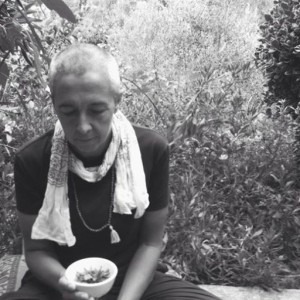For this week’s Spotlight, I asked a few questions about life and creativity to Kashyapi: poet, writer, meditation and Zen teacher, and author of some of the most beautiful poems featured on Naviar.

How did your spiritual journey begin? Can I call it spiritual journey?
When it began, I didn’t know it was beginning. When it ended, I didn’t know it was ending. Yet, somewhere in between these two points in time, there was the idea that there was a spiritual journey, and that I was on it.
You can call it what you like, ultimately, all spiritual journeys end in the same place. The road ends. No journey. No location. Only the memory of the journey remains, and that is not it.
Looking back, if I explore my own memory of the spiritual journey, I can name a couple of key points.
In truth, I can say that my spiritual journey began at birth. Because the moment a human being is born, there begins, unknown often to the individual, the quest to know who we are, where we came from, and what all this is about.
I received a spiritual education, through Roman Catholic schooling, so the exploration of prayer and the concept of a greater power than that of ordinary life was introduced to me aged 4, when I entered kindergarten.
In terms of when I began to seek, to deliberately seek, that was when my personal tutor at art school introduced me to Zen, saying “I think this is you” and introducing me to the book Zen Flesh, Zen Bones, by Paul Reps. That is the day I began to look seriously for something more in life, for meaning, to devote my energies to the path of Self discovery that is at the heart of my work with others today. My work today is to help others to discover their own path, and the end of all paths.
Silence seems to be a recurring theme in your works: what does silence mean to you and what can silence offer to people that the “everyday noisy life” cannot?
Yes indeed, silence is not so much a recurring theme in my works, as the source all my work, whether it be poetry, writings, meditation, contemplation, retreat or silence itself. All my work arises from silence, in one way or another.
Both silence and sound are inseparably connected. Sound arises from silence. When considered from the ultimate, all things, all perceptions, arise from silence.
Silence offers nothing that cannot be found in “everyday noisy life”, nothing at all. It is from silence itself that this “everyday noisy life” arises, and it is back to it that it returns, when even “everyday noisy life” fades away.
With respect to ultimate reality, there is no silence, yet the ultimate is also often referred to as silence, from which all phenomena arise, including the phenomena of both noise, and peace. This is the ultimate silence, the one to which I refer to most often. I make no discrimination, as it is true in either respect.
These bodies are born from and die back into the silent stillness that I refer to as silence. It is not only where we come from and go to, it is who we are.
So when we sit, lay, or walk in silence, we reconnect with ourselves, we rediscover our true nature, finding that there is nothing to rediscover, as it has never been, and can never be lost. Or found. It is not even eternal. It is before even time. Time arises in it.
This is the silence I refer to, and from which my work arises.
I also have a deep love of phenomenal silence, and do believe that it is a good starting point for those in search of the ultimate answer to who they are, which is at the heart of my work in the world.
Do you think there’s a connection between meditation and creativity?
Yes. Without a doubt. In their purest and most natural forms, meditation can give rise to natural creativity, and creativity can give rise to natural meditation.
Creativity arises easily, you could say, spontaneously, from meditation. Creative practice can be a meditation too. Just watch an artist or musician at work, when they’re deeply engrossed in that work. That is a meditation.
Engrossed, we are lost in the process, absorbed by it. Lost, completely lost. This is the highest meditation, to be completely lost, to lose all separate sense of self-identity.
There is no creative act and no creator / artist. There is just creation. Both creator and creation are part of the whole thing. Both are lost in the process, belonging to one another, as lover and beloved.
On a more practical note, to stop and sit, prior to entering one’s studio or other creative practice, is a way to let go of the world. Letting go of the world, we enter the creative process empty handed, ready to receive. When we enter with full hands, and a full head, with an idea of the outcome, we are limited. Empty handed, we are unlimited. In Zen, there is a saying — “The bird of paradise cannot land in a closed hand.”
Each week Naviar’s community explores the intersection between music and haiku: in your opinion, what’s the relationship between these two disciplines?
Poetry and music. Some of the earliest poetry has been described as song. The songs of Shantideva and Milarepa, the Bhagavad Gita, so many sutras are the spontaneous song of the one voice. These wondrous creatives, the monks of ancient times, gave rise to spontaneous song, laying no claim to it. This is the song of the Universe. This song of the Universe arises naturally, harmonious and perfect in its form and content.
Music, without the presence of song or words, is also the song of the universe. I enjoy minimalist ambient music in particular, finding it to have great affinity with the world of haiku. I love the ability of a musician to create atmosphere and spaciousness within a limited structure, to bring the elements into being. Such is the work of a haiku poet.
In it’s highest form, haiku is not just a poetic form, it is a way of life. The way of haiku. If music is also taken to it’s highest form, it too is a way of life.
I love that haiku can inspire the creation of music. I believe it has a similar effect to taking a walk, or sitting out in the natural world, due to the power of haiku to place us within nature. As such, the world’s collected haiku, ancient and modern is a vast creative resource for the inspiration of any musician.
I also believe that music can inspire haiku. Now there is an interesting project for Naviar Records to explore.
Do you have any books or readings you’d like to recommend to someone who wants to explore the world of meditation?
Oh, there are so many excellent resources for the one who wants to explore the world of meditation. Here are a few.
Online /
My journal. I share spontaneous writings, notes, koans, poems, meditations and contemplations here, most days. http://kashyapi.life/journal/
My audio. Listen to some of my free audio meditations. I am adding a shop shortly, and will be selling audio guided meditations and books to inspire newcomers to the practice. http://kashyapi.life/audio/
Micro meditations /
Try some of these tiny, simple meditations, for an easy way to introduce meditation into your life and create some breathing space.
Pause button meditation. http://kashyapi.life/2010to2015archive/pausebutton
Tea meditation. http://kashyapi.life/2010to2015archive/teameditation
Forest bathing. http://kashyapi.life/journal/forest-bathing/
Books /
You cannot learn to meditate from a book. It’s a simple fact. Meditation is your natural state, and the act of meditation is simply a way to recognise that which is already present, our natural state.
Although you cannot learn from a book, you can be inspired to practice, and to take the voyage of self-discovery through meditation and contemplation.
I am currently writing a book to inspire meditation and contemplation as part of daily life. Check in to http://kashyapi.life/publications/ for current and forthcoming books.
Zen Mind, Beginner’s Mind by Shunryu Suzuki. Not a book of meditation, per se, but an inspiration to practice, to understand, and to simply be. My most recommended book of all time.
http://www.amazon.com/Zen-Mind-Beginners-Shunryu-Suzuki-ebook/dp/B00I8USOM0/
How to Sit, by Thich Nhat Hanh. How to Sit offers clear, simple directions and inspiration for anyone wanting to explore mindfulness meditation.
http://www.amazon.com/Mindfulness-Essentials-Thich-Nhat-Hanh-ebook/dp/B00IQY3L1M/
The Art of Just Sitting, by John Daido Loori. Essential Writings on the Zen Practice of Shikantaza. Shikantaza, “just sitting” is one of the simplest, most subtle forms of meditation, and one of the most easily misunderstood. This book brings together a wealth of writings, from the Buddha himself to Bodhidharma and Dogen and many of modern Zen Buddhism’s most influential masters, all pointing directly to the heart of this powerful practice.
http://www.amazon.com/Art-Just-Sitting-Essential-Shikantaza-ebook/dp/B003XF1LJI/
The Method of No-Method by Chan Master Sheng Yen. The Chan practice of silent illumination, a spiritual practice uncomplicated enough for anyone to learn, yet rich enough to be worked with for a lifetime. The traditional Chan (Chinese Zen) practice called Silent Illumination begins with nothing more than putting aside all thoughts except the awareness of oneself “just sitting.”
https://www.amazon.com/Method-No-Method-Practice-Silent-Illumination-ebook/dp/B00C5KK72E/
Retreat /
Take time out. Take a walk. Breathe. Sit. Breathe. Be. Forget. Let go. Make time to go on retreat. Find a retreat that resonates with you, or visit http://kashyapi.life/dojo/ for info to inspire and support you in learning meditation and taking time out for retreat.
What are you up to at the moment?
Today, I am living in the forest on the West Coast of SW Portugal, where I am guiding others face to face in meditation and retreat.
I’m writing a new four part Zen insight meditation program, which will be a book, a face to face course, and an online course.
I’m recording spontaneous guided meditations, which will be available through my website at http://kashyapi.life/audio/ as they are released.
I’m writing a solitary retreat handbook to enable readers to take a solitary retreat at home, or elsewhere, safely, and to the maximum benefit. This will be available as a book, and also with Skype or face to face support here in Portugal.
I’m seeking land here in SW Portugal to develop a small solitary retreat project, providing silence, simple accommodation, food, guidance and support.
I’m editing my archive of over 4,800 poems into a series of book collections and prints, for release on Amazon and in my online shop later in 2016 and early 2017.
I have a couple of collaborative projects under way, involving my haiku, brief meditations and contemplations, a photographer, a meditation teacher and a breathing meditation app.
Thank you for your time!
Thank you! It’s been my pleasure. I have enjoyed your questions, and hearing the answers that arose. I hope it will be as much pleasure to your readers! Thanks too for the opportunity to participate in the Naviar Records Haiku and Renku challenges. I’m loving it.
